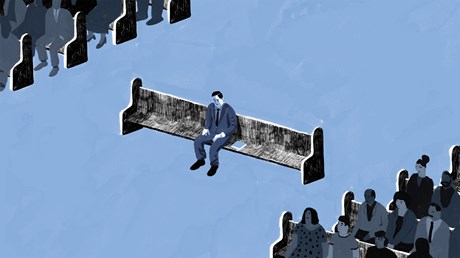Why were evangelicals as lonesome as everyone else before COVID-19, but less so after?

I can’t remember at what point I realized that I would probably go two years without a hug. Nobody knew how much worse the pandemic would get, but I knew I would be stuck in place for the duration. My friends felt a world away. Phone calls with my family had become strained. I couldn’t tell how they were really doing or articulate how I was handling the stress. (Not all that well: I had stopped showering altogether, and I was watching the Lord of the Rings movies repeatedly.)
I believe winter was approaching when the realization about huglessness hit me. Holidays loomed in the near future, and I wondered if I could deal with a Thanksgiving by myself, with horse meat instead of turkey.
I was in Central Asia. It was 2004, in the thick of the bird flu pandemic.
That period, when I was a Peace Corps volunteer, was one of my deepest experiences of loneliness. I was in a community where only one person I knew spoke English well. I could talk on a pay phone with people in the United States—through a very bad connection where I could always hear a third person breathing on the line—once every two weeks. I got sick a lot. I didn’t bathe much since the Turkish bathhouse was open to women just one day a week, during a time when I was scheduled to teach. People I didn’t know would come to my house to ask me to help them cheat on their English tests. I started talking to myself.
Some bluegrass songs, especially Emmylou Harris’s cover of “If I Needed You,” still whisk me back in time to a daybed in a little room on a steppe where Scythians’ horses had grazed, where I sat smelling like sweaty wool and writing long letters in Word XP.
And it turned out well ...
from Christianity Today Magazine
via


.gif)

.gif)
.gif)
